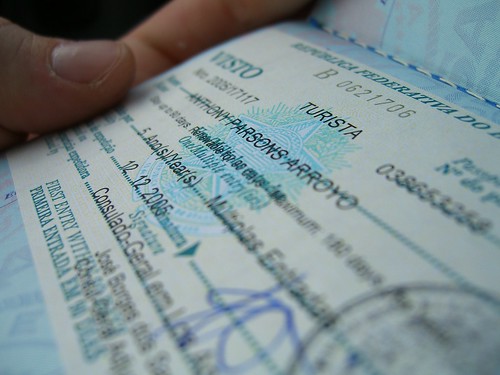
The global financial crisis, wars and natural disasters have inspired a new wave of immigration to Brazil. According to the Ministry of Justice, the number of legal immigrants entering Brazil rose by 50% over a six month period [pt] in 2012. The majority of immigrants came from Haiti, Bolivia, Spain, France and the United States.
The new arrivals have not gone unnoticed by mainstream media or the general public. Recently, the popular TV show Domingo Espetacular broadcast a report [pt] called “Perseguidos” (‘Hunted’) which tells their story. Brazilian blogger Pedro Migao [pt] praised the report for describing the many different reasons why immigrants are increasingly turning to Brazil.
However, the consequences of the upward trend in immigration remain the subject of heated debate. In an article entitled “The Other Face of a Global Player” on Mundorama.net [pt], Patricia Martuscelli says that while ‘old Europe’ is creating tougher immigration policies amid economic woes, Brazil has yet to come up with a decisive policy of its own:
It is possible to deduct that due to its inability to fully meet the demands of its own people, it would be difficult for the government to deal with domestic and international costs arising from its position as global player, particularly in relation to immigrants and refugees. Nevertheless, the more Brazil delays addressing these issues, the more it will get worse, putting pressure on its population.
Another blogger, Patrícia Mendonça, says the Brazilian state should accommodate refugees despite widespread poverty:
In spite of what they will have us believe, Brazilians are still living in a state of misery in many parts of the country. We see droughts in various regions. And there are the slums (…) The apparent rise of the D and E class is the result of the credit offered by private companies (holy Casas Bahia), but will very soon lead to an even greater rise in household debt…
One question remains: Do we have the means to welcome those refugees? Can we offer them dignity? We have a minimal level of dignity among our most poor, that certainly is greater than what they would have in their own countries.
Brazil has around 4,500 refugees from 75 countries [pt] with the biggest groups coming from Angola and Colombia. As in many other countries, refugees and immigrants in Brazil are among the most vulnerable members of society. Yet Brazil is nevertheless attempting to take concrete steps to protect immigrants from exploitation. In São Paulo, for example, a law was recently passed to revoke the licenses of establishments found to be using slave labor. The UN High Commissioner for Refugees in the Americas has developed the “Amplify your Voice” program to help empower women who have been victims of violence as shown in the linked video in Portuguese.
Brasilia also expects the influx of immigrants to boost the national economy. A lack of skilled professionals is considered a major factor holding back Brazil’s economic development, a predicament that the government hopes to overcome by attracting suitably qualified immigrants [pt] to the country. The development of successful immigration policies may, therefore, make a telling contribution to Brazil’s reputation as an emerging global power.
For additional reading on this topic please see:
Between Fear and Compassion: How Refugee Concerns Shape Responses to Humanitarian Emergencies
Human Rights Violations in the Field of Migration
For more information on issues and events that shape our world please visit the ISN’s featured editorial content and Security Watch.

